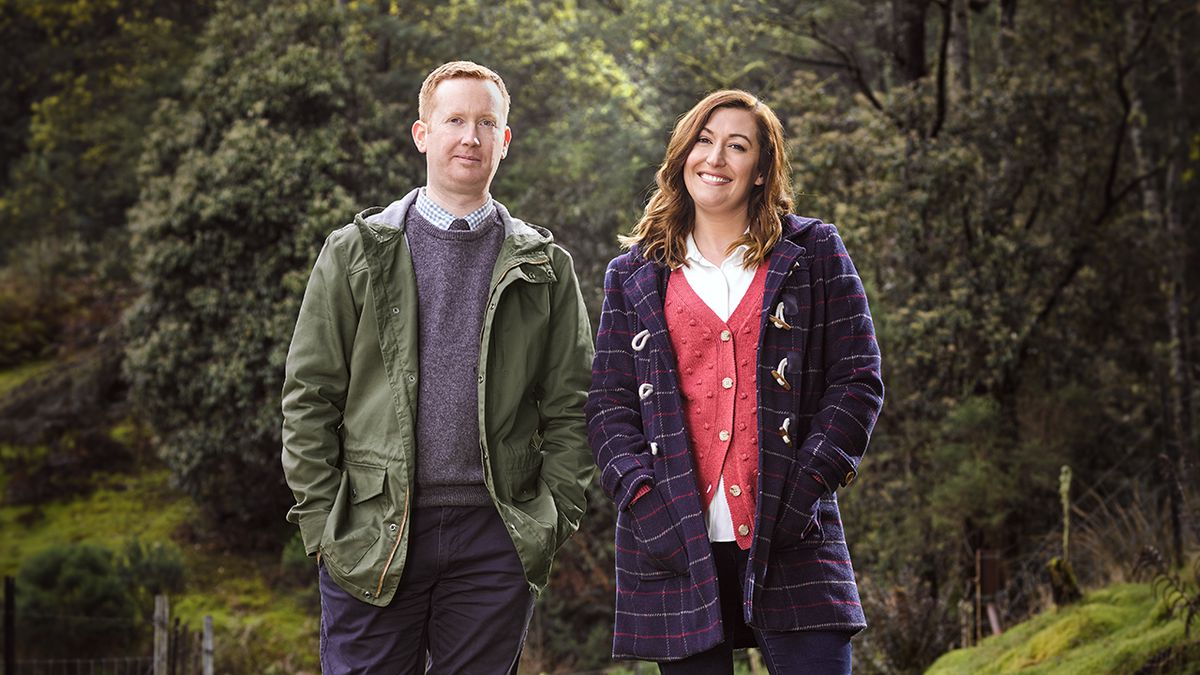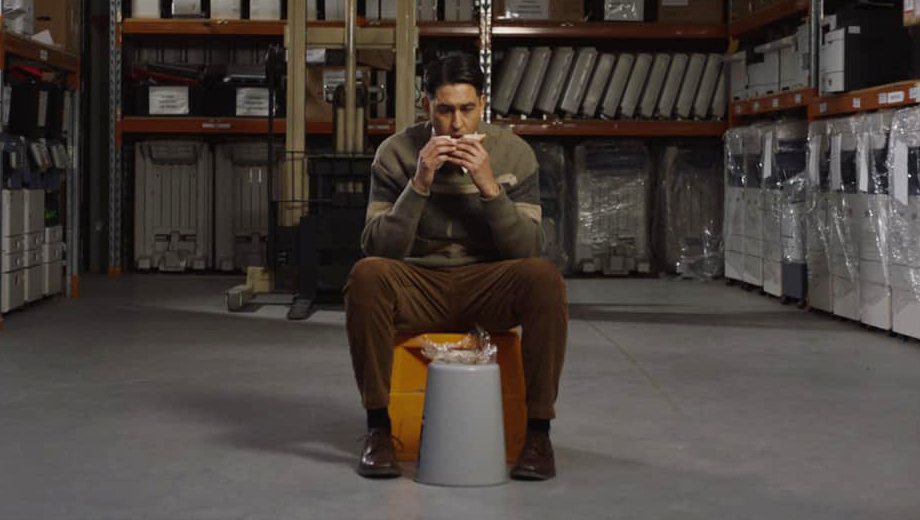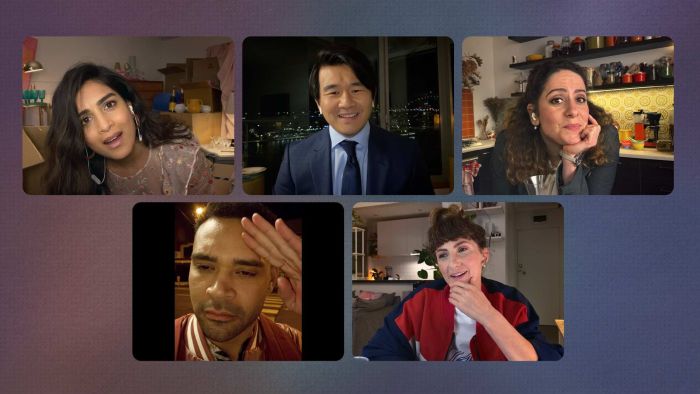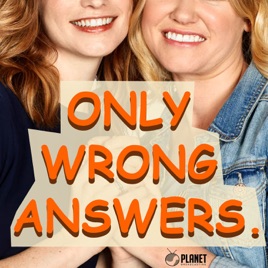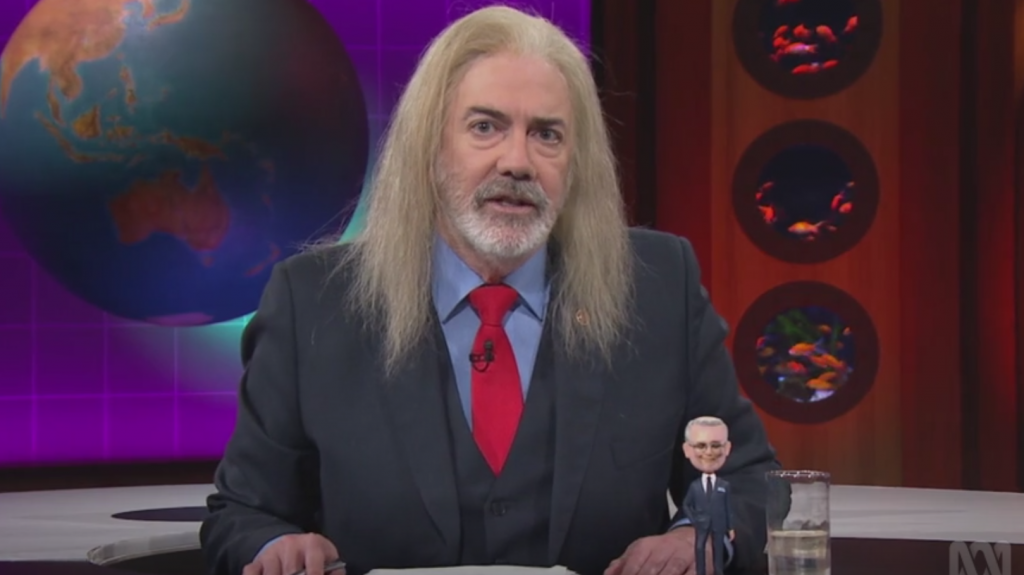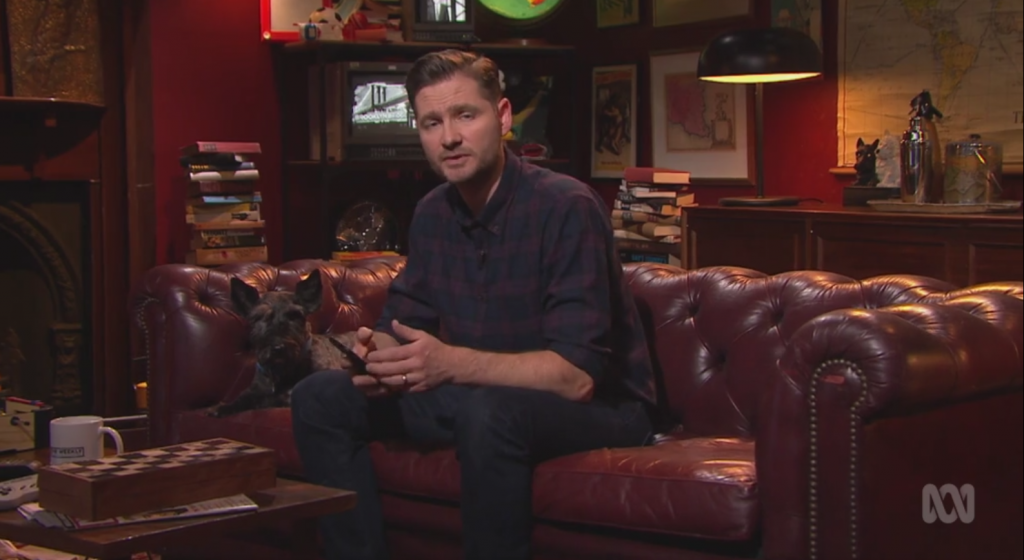Australian Tumbleweeds
A New Day Dawns
Press release time!
This came as a bit of a surprise here, as we’d thought he’d nabbed the top job months ago:
Producer Todd Abbott (Please Like Me, Micallef Tonight, Geoffrey Robertson’s Hypotheticals, Judith Lucy’s Spiritual Journey, Rove) is the hot tip to join the Entertainment and Specialist division.
ABC has been without a Head of Comedy since Rick Kalowski departed in February.
And just look how well they’ve been doing since then! Seriously, we’d hazard a guess there was more new comedy commissioned this year (what with the rush of corona comedy) than the last… three years of Rick Kalowski’s reign, so somebody must have been left behind to push the big red button marked “go”.
Anyway, big congratulations to Todd Abbott, who clearly has an extensive resume as far as decent comedy goes* and also Please Like Me. Maybe he’ll bring back The White Room! Finally its time has come.
Of course, these days at the ABC The White Room would literally be just an empty white room, as they don’t have the money to put anyone in it. It’s not exactly a good sign that he’s taking on the job (if he is actually starting this week; we’re going by a media newsletter, not an official announcement) at a time when the ABC can’t even manage 90 minutes of new comedy content on a Wednesday night.
Not that he’ll be responsible for the majority of the ABC’s “comedy” line-up either. For a while now the ABC’s increasingly shoddy Wednesday night has been roughly as follows: one game show or lightweight interview thing at 8pm, one news satire show at 8.30pm, and one sitcom. sketch show or slightly more serious interview thing at 9pm. Things may have changed since we last knew what we were talking about, but from what we remember of how things work, out of these three, only the scripted comedy – sketch or sitcom – counts as “Comedy”; everything else is light entertainment, including Mad as Hell and The Weekly.
Things could obviously be worse – it’s not like Abbott has arrived threatening to “axe left-wing comedy” like in the UK – but you couldn’t seriously say ABC Comedy is in glowing health. It’s hard to know exactly why the comedy department shrank so severely under Rick Kalowski’s leadership. We weren’t the first to note that practically nothing new was commissioned during his tenure; whether that was thanks to dwindling budgets or a decreased appetite for risk from head office we don’t know.
What we do know is that without a couple of rushed-out lockdown series the only ABC sitcom this year would have been season four of Rosehaven, and we’ve yet to hear anything that makes next year sound any more promising. Hopefully Abbott’s brought a truckful of money with him; without that, those repeats of Utopia are going to become permanent fixtures.
.
*It’s interesting to compare his resume – which is mostly talk shows and live stand-up recordings, AKA the cheapest possible comedy television you can make and still be making both comedy and television – with Rick Kalowski’s, which was mostly based around (very broad) scripted comedy. Around the time Kalowski was hired there was a bit of talk that bringing him on board was going to signal a new direction for ABC comedy towards more mainstream fare; that didn’t really happen, but if we assume a Head of Comedy’s past work is an indication of where the ABC sees its comedy future, then it looks like they don’t expect a boost to the budget any time soon.
Vale Rosehaven series 4
So ends another series of the slight, very slight, adventures of Emma and Daniel in Rosehaven. And by Rosehaven standards, this episode was action-packed.
Four episodes previously, Emma (Celia Pacquola), Daniel (Luke McGregor) and Barbara (Kris McQuade) had attended a regional real estate conference, where they’d met big-shot agent Donovan (Josh Quong Tart), who’d tried to head-hunt Barbara for his agency. Now Donovan’s arrived to set-up shop in Rosehaven, is spending big on marketing and has even shouted the entire town a drink. How can our heroes at McCallum Real Estate compete with that?
Like we said, as episodes of Rosehaven goes, this was high stakes. Or had any sort of stakes at all. Usually, Pacquola and McGregor fill their allotted 25 minutes with little more than a flimsy plot (half the town’s on work experience), some pointless banter (we have double chins and we should do something) and the odd zany character, such as Anthony Morgan as local idiot, Phil.
Phil’s occasional appearances are especially welcome, as they provide almost all the best comic moments. In last week’s penultimate episode, when half the town seemed to be on work experience, Phil volunteered to let local cop Greg (Phil Hardwick) show his work experience kid what it’s like to arrest someone. Cut to a few seconds later when Phil decides to let the kid see what it’s like when an arrested criminal escapes, and runs off, still in Greg’s handcuffs, hotly pursued by Greg who doesn’t find this at all amusing.
In this series finale, sadly, there was very little Phil. But there was a nice moment where Phil tried to drink all of Donovan’s bar tab himself. Ah, Phil, if only he was in the show more often…
Rosehaven’s problem is that the style of comedy it revels in – not much happening – is also its greatest problem. And we, the audience, need something to happen. A decent plot to keep us watching, for instance. And this week aside, there haven’t been a lot of those this series. That and sometimes it’s a bit grating when Emma and Daniel start up on the banter. Yeah, OK, it’s fun when you’re doing it with your friends down the pub (or more latterly on Zoom), but it can get a bit draining when you’re watching third parties do it.
But four series in, who’s going to listen to us critiquing the signature style of a sitcom which has got four series and will no doubt get a fifth. So, see you in a couple of years for our review of series five, when we’ll be making all these points again.
Comedy Stans
Press release time!
STAN ACCELERATES GROWTH STRATEGY AS NINE THROWS WEIGHT BEHIND ORIGINAL PRODUCTIONS
Expanded slate of upcoming Stan Original productions also announced
Followed by a bunch of stuff that isn’t really of interest to us here today. Basically, as various international streaming services look to expand their operations, Stan is increasingly in a bit of a pickle. Showtime (who provide a lot of Stan’s high end product) are planning to move on, and to stay viable Stan needs a new source of shows people want to watch. Their solution? The same as everyone else’s: start making their own shows.
The only slightly interesting thing about this is that they’re going to be teaming up more directly with Nine as far as the production side of things goes, which presumably means that some if not all of the series they’ll be making for Stan will also turn up on Nine eventually. Which explains the bit about this press release that is interesting to us: they’re only doing one comedy. After all, what would Nine do with new comedy?
Dom and Adrian: 2020, an original comedy special from the creators of the Bondi Hipsters, Christiaan Van Vuuren and Nick Boshier, is currently in production.
This lack of comedy (the other four projects announced are all pure drama) is how you know they’re serious about things. Comedy has always been the cheap and cheerful side of local production, but on streaming services comedy has basically been a procession of filmed stand-up specials and the occasional “wacky” game show, with the rare ultra-low budget sitcom (remember No Activity?) thrown in.
Streaming services are all about luring viewers in, which means streaming services are (mostly) all about quality drama. That’s because quality drama is the kind of thing people will pay money for: unlike cheap, throwaway comedy, it seems like good value for money.
But weirdly, comedy is what people actually want to watch a lot of the time. That’s why pre-streaming television (which actually had to keep people watching, rather than just get people to pay up front for something they might rarely glance at) was packed with shit, utterly forgettable drama and sitcoms that people are still happily watching and laughing at today. People are still watching Friends and Seinfeld; who’s watching The Wire?
So while there’s little doubt that this –
Australia’s leading local streaming service Stan today announced it is ramping up its slate of local and internationally produced Stan Original television series and films, with volume to increase to over 30 productions a year over the next five years.
– is going to also mean more filmed live comedy and other super-cheap local laff-getters to make the numbers add up, the sad fact is that comedy is no longer seen as a quality premium product by Australian networks (and probably audiences). New comedy is something cheap you bung on to make it look like you’re a real network and not a warehouse full of old VHS tapes of 90s sitcoms, even though most of what people watch streaming for – old sitcoms – is comedy.
Anyway, that’s a problem for twenty years from now when we’ll all be dead anyway. Meanwhile, we have this to look forward to:
Dom and Adrian: 2020 is a mockumentary chronicling their journey through the garbage fire that is 2020.
Having been billed to play at a premier bush doof, Dom and Adrian’s USBJ’ing (DJing with pre-loaded USBs) career was on precipice of taking off… when the bushfires hit. They were next booked to play a bushfire fundraiser when the floods washed through. Then they were going to headline a flood-relief show when the hail storms came down. And now, the night before their biggest gig yet, raising money for the #PanelBeatBondiAiD movement, the whole country was thrown into lockdown because of one little global pandemic, “Such a nanny state!”.
In spite of the initial personal turmoil, the two best friends quickly see all this as an opportunity to refocus, “pivot” and evolve creatively – but as time goes on, it’s not only their creativity and entrepreneurial-ship that’s tested, but their friendship and sanity.
Across the mocumentary special, Dom and Adrian try desperately to remain positive, make rent and redefine their lives. And hey, there’s always regrowth after a fire – so by traversing madness, 5/6G conspiracy theories, being baited by the illuminati and philosophical clashes, Dom and Adrian are forced to rediscover why they’re best friends in the first place.
Dom and Adrian said: “The number 2020 used to be synonymous with good eyesight. But given how much of a bin fire 2020 has been, we’re fully going to have to find a new number to define good eyesight. “The fall of capitalism has made us a lot more resourceful and there’s a lot of interesting ways you can eat ibis.”
Nick Forward, Chief Content Officer at Stan, said: “We’re delighted to be working with Christiaan, Nick and the team. We’re huge fans of everything the boys have done and we’re really looking forward to being able to bring some laugher and lightness to 2020 – all through the lense of the Bondi Hipsters.”
Lee Naimo, Senior Online Investment Manager at Screen Australia, said: “We are delighted that Christiaan Van Vuuren and Nick Boshier are teaming up with Easy Tiger Productions and producer Julia Corcoran to bring the unique and often hilarious points of view of Bondi Hipsters Dom and Adrian to Stan and YouTube.
“The Bondi Hipsters were part of that first wave of Australian online content creators to carve out a niche with online sketch comedy and we can’t wait to see them further develop these iconic characters as they cope with isolation and the challenges of 2020.”
Stan Original special Dom and Adrian: 2020 is created by Christiaan Van Vuuren and Nick Boshier and produced by Julia Corcoran in partnership with Easy Tiger, with Christiaan Van Vuuren also directing. Additional social content will be developed by the creators to accompany the special on Stan.
A viral hit with millennial audiences, the Van Vuuren Bros, Bondi Hipsters and Soul Mates YouTube channels have a collective subscriber base of over 150,000 and boast over 25+ million views to date.
And who’s going to argue with those numbers?
Paper Champions: A Movie Review
Remember movies? Worse, remember Australian comedy movies? Oh sure, there was that Paul Hogan one a few weeks back, but aside from that? Nothing. Well, nothing unless you’ve been scouring the listings for the various Australian film festivals that have been forced to relocate online thanks to 2020 being garbage, in which case you may have spotted a little film called Paper Champions.
Usually a film screening at MIFF (the Melbourne International Film Festival) would be tough to catch: films showing at festivals usually only get one or two sessions at one location, so while it’s all nice and exclusive for those who can make it, everyone else is out of luck. But this year, things are different: MIFF is now entirely online, which means that anyone anywhere can watch the films on offer. The films (aside from a handful of high profile titles) can also be watched at any time you choose once you fork over your money. All of which means you have roughly four days left to check out Paper Champions from the comfort of your own home. The real question is… should you?
The story of a subdued-to-the-point-of-comatose photocopier salesman, it’s the kind of Australian comedy film that’s more about the “film” side of things than the “comedy”; anyone expecting a laff riot should keep on scrolling. Though probably not scrolling through the MIFF listings as there’s bugger-all else as far as comedy goes this year. But as is often the way with even low budget Australian films these days, Paper Champions looks okay, has a decent cast, and has a clear beginning, middle and end story-wise so even if you don’t laugh (and you probably won’t) you’ll still leave feeling like you saw an actual film.
You may even feel like you’ve seen a number of films, as the big problem with this small film is that there’s just too many subplots. Subdued dude Rey (Luke Saliba, who also produces and co-wrote the script) is trying to get his mana back (think of it as a Polynesian version of “his groove”) and so he goes through a range of situations trying to figure out how he can regain his spark. Part workplace comedy, part awkward family comedy, part awkward family comedy only with his best friends family, part wrestling movie, part rom-com, part dance movie, part jokes about photocopiers and there’s a rugby game in there too, this really needed to pick two or three subplots instead of spraying ideas all over the place.
It’s all largely held together by Rey – he’s the one constant in all this, so the constant shifts aren’t as annoying as they might have been – only Rey spends a lot of the movie just sitting there being a sad sack. It’s a slightly odd choice for a movie that’s clearly been put together as something of a showcase for Saliba (co-writer and producer, remember), as it feels like the kind of thing you’d do if you were making a movie around a lead who wasn’t that compelling a screen performer. But Saliba does come across well throughout, and the rare scenes where he perks up do register as big moments. Hey, maybe he’s just a generous guy who wanted to let just about everyone else in this film steal almost every scene he’s in. Being the straight man in a comedy is a thankless job.
But is it funny? There’s two possible scenarios to consider here:
A): Australian film is so firmly built around the grants system these days that you can hardly blame film-makers for wanting to tailor their product to funding bodies rather than audiences. Even if they didn’t get or need a grant this time around, who knows when they’ll have to knock on (say) Film Victoria’s door, cap in hand? And with comedy still seen as something popular that doesn’t need funding, increasingly Australian screen comedy looks like Paper Champions: a film that often feels like it really wanted to be funnier, but then remembered it was time to drop in some family drama just to make sure we knew we were watching a “real” movie.
B): There’s a lot of things going on here that feel like they probably seemed funny written down, but don’t really work that way on the screen. The wrestling subplot is pretty over the top; Rey’s work features more than the usual amount of kooky characters; someone dances really, really badly. And there are a handful of moments here that are legitimately laugh-worthy, alongside a lot more that feel like they’re meant to be running gags or quirky observations. It doesn’t try so hard to be funny that it’s failures are painful to watch, but that also means there are long stretches of this film that are just… you know, pleseant.
Either way, the end result isn’t the worst Australian comedy film of the year. Which has got to count for something even if there’s only been one other Australian comedy film this year. Supposedly Paper Champions will be getting a cinema release once people feel safe enough to go into cinemas, so you might want to hold off and see this one on the big screen… but probably not.
Vale Retrograde
In the first ten minutes of its final episode Retrograde slapped down the “whoops, someone’s dead, time to get serious” card so hard for a moment we thought we were watching Please Like Me all over again. Was there an eulogy full of “confronting” swearing? Was there a slowed down super-sad cover version of Talking Heads’ “Once in a Lifetime”? Was this show still a comedy? Answers on the back of a postcard.
It’s been close to thirty years now since sitcoms first started seriously exploring the concept of a wacky group of friends just hanging out. It’s probably time somebody came up with a new idea. The twist here was meant to be that the whole show took place via a “not Zoom” conference call, but most of the time that was used for the kind of reaction shots from other cast members that are supposed to make you think you’re watching something funny when all you’re really watching is a bunch of reaction shots.
Which pretty much sums up Retrograde. Firmly determined to put together a cast of cool types pushing 30 who act like teenagers, it never managed to come up with any kind of comedy dynamic between the cast, let alone much comedy in general (the comedy climax involved two characters hiding behind an umbrella while someone threw fruit at them). The online chat format definitely limited any kind of physical chemistry between the cast, but there was no real attempt to conjure up verbal sparks here either. Anyone could have been talking to anyone else for all the difference it made; there was never a point where two characters really stood out as a funny team.
Supposedly the biggest problem facing rom-coms this century has been the lack of obstacles to keep would-be lovers apart. When society is largely on board with the idea that “the heart wants what the heart wants”, it’s tough to keep two or more people apart long enough for a story to develop. So you’d think the enforced isolation of lockdown would be a boon to anyone looking to put together a romantic comedy, right? Not if you were watching Retrograde.
Considering there was next to nothing else going on dramatically each week, it’s bizarre how badly this fumbled the rom-com side of things. All that needed to be done was to have two likable characters flirt and fall for each other, only to find they couldn’t be together; instead this spun its wheels for six weeks as our heroine moved in with one guy then wondered about another but still felt something for the first guy and everyone else though the other guy was a jerk and… why did we care again? And how do you write a love triangle where both of the guys are losers?
Pretty much all the classic “will they or won’t they” plotlines in sitcoms weaved in and out of a whole lot of episodes that were about something else entirely (also: funny). Likewise, the rare successful dramatic moment in a sitcom usually came as a surprising change of pace well into the run, not as a predictable end to the first handful of episodes. Traditionally, these things worked because they were rarely used: the currently popular idea that if you take 22 episodes worth of unresolved sexual tension and surprise dramatic moments and pack them into six episodes they’ll work just as well has been proven to be a dud so many times now it’s worth wondering if anyone making sitcoms today ever watched anything beyond The Office and Friends.
We often continually bitch about how Australian television comedy is increasingly driven by the desires of funding bodies and TV executives rather than audiences. That’s because when you ignore what people want to watch the result is shows like Retrograde: perfectly well-made products with decent casts that give viewers no reason whatsoever to keep watching. There was no comedy hook, no premise beyond “friends talk on Skype”, nothing going on that you could even put in a promo as a reason to tune in – let alone something to keep you coming back week after week because all this had going on was dull soap opera twists and a bunch of generic types being blandly sassy.
Retrograde wasn’t a failure. It wasn’t memorable enough for that.
So, so wrong
The great myth put about by those in power is that they know what they’re doing and that we should trust them (maybe you can think of a recent example of that). So, ultimately, perhaps, we’re all better off putting ourselves in the hands of people who don’t know what they’re doing? Could we really be worse off if we did?
That’s the theory behind Kate McLennan and Kate McCartney’s sporadically-released podcast Only Wrong Answers, in which people with a problem email the Kates to ask for help. Relationships, kids, careers, this pandemic thing that’s happening…the Kates’ll have a go at finding a solution to anything. Or not, most of the time.
A lot of the laughs in Only Wrong Answers come from Kate and Kate not actually helping anyone, more beating themselves up, or having a go at the person who had the temerity to ask them a question. They’re the real problem, after all.
Everyone will have their favourite moment in Only Wrong Answers, but we particularly enjoyed the rant about Gen X music lovers hating on the music their kids listen to. Because men of a certain (highly opinionated) type are always worth kicking.
So – and we’re talking mainly to that certain type of man, here – if you didn’t enjoy the tone of Get Krack!n, you will also dislike this. It’s just not for you. Move on with your lives.
But if you did like Get Krack!n, then this is more comedy in that same vein. Except it’s looser, like you’re in an ideas session for Get Krack!n and someone’s edited-together the highlights.
That someone, by the way, is Greg Larsen (Tonightly, At Home Alone Together), who has very skilfully selected the best bits of Kate and Kate’s rambling and cobbled them together with some well-timed musical stings. Who knew editing could give a podcast the edge? Not many podcasters, that’s for sure.
Also worth noting is that this won’t be the last audio project from the Kates:
The duo are writing a new fiction podcast for Amazon’s Audible, eyeing a launch next year, titled Slushy – “a traditional sitcom, but for your ears,” says McLennan – set on an Australian research base in Antarctica.
So, listen out for that.
All Just a Little Bit of History Repeating
You can tell when Mad as Hell is angry at the ever-increasing rightward tilt of Australia’s media and politics because they start making jokes about Labor. So it was no real surprise that Mad as Hell came roaring back onto our screens this week with a few extremely cheap shots at the nominally left-ish side of Australian politics. Us? We loved it.
Partly that’s because, with the ABC itself seemingly trying to curry favour with the right – when ABC board chief Ita Buttrose isn’t calling young people sooks she’s asking mining magnates to give high profile lectures to explain why the country should continue to be run exclusively for their benefit – it certainly can’t hurt to provide a bit of “balance” when it comes to political comedy. The days when the right spent their spare time complaining that the ABC’s political satire was too hard on millionaires and didn’t spend enough time mocking the poor are long gone, but presumably Gerard Henderson could rise from the grave if anyone was foolish enough to spill some human blood anywhere near it.
But what we really enjoy about Mad as Hell‘s swipes at Labor is that they’re almost always really directed at the right-wing’s view of Labour. “If Labor got in they’d waste all the money and send this country into economic ruin” would be a devastating insult if it wasn’t for the fact that when it comes to economic mismanagement the Federal Coalition wrote the book and then sold it for less than it cost to print. It’s so stupid it’d be a joke if it wasn’t also a right-wing core belief… hang on, why can’t it be both?
Mad as Hell gets to have it both ways: if the Liberals and their minions complain that the show is biased against them, what with the 25-odd minutes of jokes and vitriol directed directly at them and everything they stand for, there’s a number of blunt anti-Labor statements Micallef and company can point at to balance the books. And for anyone with an actual sense of humour, those anti-Labor statements are clearly aimed directly at the kind of unthinking political automatons who would accept said silly statements at face value. The real winner? Comedy!
Our half-baked political analysis aside, this week’s return was a stark reminder of just how good this show is. Whether it was the return of Roz Hammond advertising a bizarre eye expander, Micallef explaining that they wouldn’t actually be doing a “release the Karen” bit because they’d already used that gag in a caption ten minutes earlier, or a hilarious monologue about testing for Covid in people’s sewage that contained the line “Fuckin’ government poo hunters”, Mad as Hell came back firing on all cylinders and thank god for that.
We did feel bad at finding out that the original “mad as hell” guy hasn’t been getting any royalties for his regular appearances in the opening credits though. Typical bloody commie ABC.
Money Changes Everything
Press release time!
Screen Australia has announced 14 feature films, eight online projects and 20 television dramas that will share in $1.6 million of Story Development funding.
The latest slate includes Toni Collette’s directorial debut with feature film The Best Of, and an anthology of Shakespeare’s works re-imagined by teams of creators including Leah Purcell, Elise McCredie and Anchuli Felicia King called Shakespeare Now.
Screen Australia’s Head of Development Nerida Moore said, “While this has been a turbulent, challenging time for many in the industry, it hasn’t stopped the drive, passion and imagination of Australian creative teams. In fact we have continued to see applications coming through with really strong and distinctive content, with the application numbers across March-June this year up 76% on the same period last year.”
“It’s exciting to see re-imaginings of well-loved stories such as Shakespeare Now and an animated series inspired by The Sapphires. And we continue to support storytelling on all platforms, with two online series from comedians Gabriel Willie (better known as Bush Tucker Bunjie) and Chloe Black who are each creating their first scripted narrative comedies.”
You can read the whole thing here, and rarely have we seen a more sustained assault on the idea that scripted television production in Australia is in any way driven by audience demand. So yeah, business as usual.
Still, after spending much of the year (decade?) bemoaning the fact that there simply isn’t all that much Australian comedy around, you might think we’d be thrilled at the prospect of a rush of new comedy projects lurching towards our screens. Oh sure, none of them sound funny – more on that in a moment – but it’s the execution that counts in comedy and any one of these could conceivably be a winner.
Unfortunately, it’s extremely unlikely that many (any?) of these series will ever make it in front of an audience. Well, the Shakespeare one probably will as they’ve already got the ABC on board and adapting Shakespeare means they don’t have to spend money on scripts, but by the time they get around to making this the ABC will be a couple of people driving around in a car shouting out the weather report to passers-by so lets not count our chickens just yet.
But otherwise? This is development funding – cash being given out to various insiders, mates and cronies to polish up some concept or another until the free money runs out they can pitch it to a network willing to put in some real funding to make it happen. Do we have any of those in Australia interested in this kind of thing? Do you really have to ask?
This (partially) explains why so many of these concepts are pitched as “comedy”, despite sounding about as funny as… well, this:
A six-part television comedy called DNA Dad (working title), centred on neurologically diverse young man Michael who discovers his biological father is UK actor Ben Miller, and travels to London to meet him. The connection leads both men to discover the true meaning of family.
Hilarious stuff, and we haven’t even got to The Mayor of Nothing, in which Andrew Knight decides to remake his hit Seachange only instead of moving to a quirky seaside town now our lead “in a grief-induced act of insanity, buys a rundown village in rural Italy and drags his three daughters on an ill-conceived restoration mission”. Yeah, that grief-induced insanity always gets the big laughs.
But because “comedy” sounds slightly more commercially appealing than “drama”, pretty much everything not set in the past or featuring a “mysterious young girl” is either a comedy or a dramedy, thus rendering those terms completely meaningless. You want proof?
Six-part dramedy New Animal, from writer Marieke Hardy (Laid), based on the upcoming debut novel by Ella Baxter. The television series follows 28-year-old oddball Amelia who works as a cosmetician at a family funeral parlour. After the sudden death of her mother, she is drawn into the local BDSM community in an attempt to deal with her grief. New Animal will be produced by Jason Stephens and Helen Bowden of Lingo Pictures (Lambs of God).
Where to start? Putting aside the involvement of perennial funding body favourite Hardy, what exactly makes an “upcoming debut novel” worthy of funding when presumably the whole idea of putting cash into adapting novels is that if you wait until they’ve been published you can pick the successful ones? Oh right, because the novel has such a brilliant concept the funding body wants to get in early and lock down the rights. What’s this book about again?
It’s somewhat telling that Laid is the series chosen to remind readers of what Marieke Hardy is capable of – or at least it would be if she had any other above-the-title credits to her name – because Laid was the last time Australian comedy tried to combine sex and death in such a thought-provoking fashion. Of course, going by the ratings the thought usually provoked was “is there something else we could be watching”, but at least the fine folks at The Age will be there to talk it up yet again because it’s not like they’re now owned by a rival network committed to the downfall of the ABC oh wait we didn’t think this through and fuck when did it stop being 2011.
But here’s the good news:
‘Development’ refers to any stage of a project’s creation as it travels towards production. It can involve everything and anything that will help get a project to the screen, from various stages of scripting to filming a proof-of-concept, such as a short film or series pilot. It can take many years for a project to reach the screen, and each project’s timeline from development to release is different due to many factors including financing, cast, locations and festival timing.
They could have just shortened that paragraph to “don’t hold your breath”.
Looks quizzical
Earlier in this pandemic, some stat went around that podcasting equipment was flying off the virtual shelves so fast that many online retailers were all sold out. Literally, everyone was getting into podcasting.
And while it’s nice that people are finding ways to keep active during lockdown…look, let’s be honest, not every idea for a podcast is worth pursuing.
The Saturday Quiz is a reboot of The Weekend Quiz, a podcast started earlier this year in which actor John Leary (you’ll have seen him in Get Krack!n, The Letdown and Upper Middle Bogan, amongst other shows) asks a couple of celebrities to try and answer the quiz questions in that weekend’s Good Weekend. Guests on The Weekend Quiz included Amanda Brotchie and Adam Zwar, Robyn Butler and Wayne Hope, and Celia Pacquola and Luke McGregor. Now, for The Saturday Quiz, Leary uses the questions from The Saturday Paper’s weekly quiz, with all-new pairs of celebs trying to answer them. In the first episode, released a couple of days ago, the guests were Kate McLennan and Kate McCartney.
If you like hearing comedians on podcasts, you may find The Saturday/Weekly Quiz interesting. But if you like hearing comedians on podcasts being funny then you probably won’t find it interesting. The basic problem is the premise.
On a comedy quiz that’s funny, Have You Been Paying Attention? for instance, the laughs come from comedians giving plausible-but-wrong or silly-but-wrong answers to questions. On The Saturday/Weekly Quiz, the theory is that the laughs will come from the guests struggling to the get to the correct answer. Because, you know, comedy is pain, right?
And if you’re a comedian who’s great at improv, and you’re on The Saturday/Weekly Quiz, then yes, you can maybe get some laughs out of the fact that you don’t know the answer to the question and are flailing about a bit. But we stress the word “some”.
See, that tactic works great for the first few questions. But after that? What the hell do you do? There are ten questions in total – you’ve gotta change things up a bit.
The best examples of anything – comedy, podcasts – look so effortlessly easy, don’t they? Like anyone can do them. But that’s just not true. Good comedy needs planning. And a good podcast has to have a premise that has been thought through.
Imagine if the comedians on The Saturday Quiz had been sent the questions in advance? Not so they could look up the answers, but so that they could plan funny things to say about them. But we suspect that’s not happening here, and it’s why this show isn’t terribly funny or much fun to listen to.
As it is, we’re just glad that The Saturday Paper only publishes 10 quiz questions a week. Imagine if it was 20? Imagine how long and painful that podcast would be.
Vale The Weekly 2020
“Let’s do this baby one more time” said host Charlie Pickering at the start of the final episode of The Weekly for 2020. Here’s a suggestion: let’s not? Oh wait, Pickering already said he’ll be back for The Yearly as part of his sappy moralising end speech that said we’ll all get through this just so long as we’re more like the generation that went through the Great Depression and World War II. What, you mean massively racist?
To be fair, there has been something of a lingering sense of doom hanging over The Weekly this year, what with everything up to and including the set jumping ship, leaving us in a strange limbo where the only thing we could rely on was that Briggs wouldn’t be appearing. Apart from that one time he did. He’s now the second longest running cast member!
Unfortunately for those of us who just want The Weekly to dry up and blow away, changing things up – even if forced upon them by the coronavirus – was exactly what the show needed. It didn’t stop it being shit, obviously, but it did stop it being stale. Yes, the new, more homely look was almost as much of a cliche as the fake news set and by the end of the series a new, just as boring rut had been dug, but for a brief shining moment there Pickering was appearing on screen without a jacket and they can never take that away from us.
Otherwise the show continued to set the bar low and then trip over it. Luke McGregor’s economics segments were pretty basic but still a thousand-fold improvement over Hard Chat, Judith Lucy did whatever she liked and was funny as usual, Corona Cops was frankly puzzling in just how amazingly unfunny it was determined to be each week and those segments focusing on Andrew Bolt’s love of scotch made him look like a harmless eccentric instead of a huge racist so thanks for that.
This was also the series that saw Tom Gleeson finally figure out he didn’t need to bother with this shit and could just go off and be a game show host for the next decade or so. Why he bothered coming back at all was a bit of a mystery: initially he was in lockdown on some property in rural Victoria, which… seemed a real thing? And then he just never bothered coming back. Presumably he wanted to take a victory lap at some stage because he’s Tom Gleeson and that’s what he does (which is probably why he didn’t just quit between series) but his few half-hearted appearances just made it even more obvious that the show didn’t really need him hanging around any longer. Kitty Flanagan went out on a high note; Gleeson went out on the brown note.
But the one thing that remained consistent throughout this year – and the show as a whole – is this weird idea that The Weekly is somehow something more than just a random collection of shit news jokes. Pickering giving a final “we’ll get through this” speech like some overly earnest glad handing politician trying to sell a new housing development in a bushfire zone that is also a flood plain was bad enough, but why put it at the end of the episode? “We’ll get through this” is exactly what we need to hear at the start of any given episode of The Weekly. Especially if the remote isn’t close by.
The problem is that whatever Pickering is like in real life, on The Weekly he comes off as a smug prick. While that occasionally works in his favour comedy-wise – some of the one-liners during his opening news round-up have almost been not bad this year – it chops off at the knees any attempt (by him) to seem like a trusted authority or audience surrogate. And yet the show still keeps on trying to ram his square peg into that round hole like he’s six months away from being called up to read the national news.
A snarky smart-arse taking pot-shots at current affairs? Yeah, when his writers are firing he can almost manage that. But a serious commentator on important issues? What possible reason could he have for thinking that’s what people want him to be? “If I’m guilty of anything,” you can imagine him saying, “it’s of caring too much… about myself”.
Guess somebody has to.


